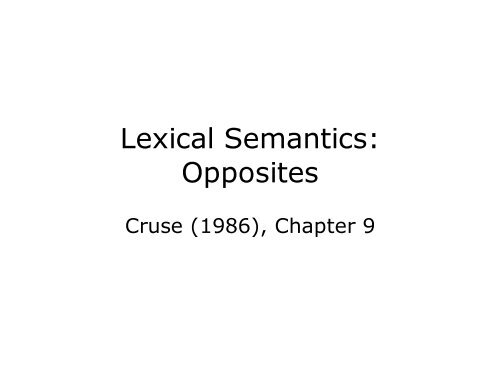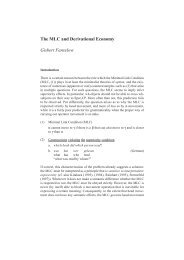Lexical Semantics: Opposites
Lexical Semantics: Opposites
Lexical Semantics: Opposites
You also want an ePaper? Increase the reach of your titles
YUMPU automatically turns print PDFs into web optimized ePapers that Google loves.
<strong>Lexical</strong> <strong>Semantics</strong>:<br />
<strong>Opposites</strong><br />
Cruse (1986), Chapter 9
Overview<br />
opposites<br />
– complements<br />
verbs & adjectives<br />
– antonyms<br />
3 sub-types<br />
– inherentness<br />
– implicit superlatives<br />
– stative verbs<br />
– contrastive aspects
Overview<br />
opposites<br />
– complements<br />
verbs & adjectives<br />
– antonyms<br />
3 sub-types<br />
– inherentness<br />
– implicit superlatives<br />
– stative verbs<br />
– contrastive aspects
<strong>Opposites</strong><br />
- cover a very large variety of<br />
phenomena<br />
- use in natural language generation is<br />
hard to make explicit:<br />
how expensive is this book?<br />
vs.<br />
? how cheap is this book?
<strong>Opposites</strong><br />
- probably the one sense relation that is<br />
most readily understood by ordinary<br />
speakers<br />
- most languages seem to have an nonlearned<br />
term for it:<br />
Arabic: ‘aksi; Chinese: tao-fan;<br />
French: contraire;<br />
German: gegensatz; ...
<strong>Opposites</strong><br />
Definition:<br />
Two words are opposites if they have<br />
most semantic characteristics in common<br />
but if they also differ in a significant way<br />
on at least one essential semantic<br />
dimension.<br />
Examples: good:bad, love:hate
<strong>Opposites</strong><br />
various degrees of opposition:<br />
prototypical instances: good:bad,<br />
large:small, true:false, top:bottom<br />
peripheral examples: mother:father,<br />
brother:sister, town:country
Overview<br />
opposites<br />
– complements<br />
verbs & adjectives<br />
– antonyms<br />
3 sub-types<br />
– inherentness<br />
– implicit superlatives<br />
– stative verbs<br />
– contrastive aspects
Definition:<br />
Complements<br />
Complementaries are a<br />
special class of<br />
opposites which divide<br />
the whole conceptual<br />
space exactly into two<br />
non-overlapping<br />
compartments.
Complements<br />
Examples:<br />
true:false,<br />
dead:alive,<br />
open:shut,<br />
pass:fail (an examination),<br />
male:female,<br />
even:odd
Complements<br />
test:<br />
If one term is denied, the other term has<br />
to be asserted - and vice versa:<br />
This dog is male.<br />
entails and is entailed by<br />
This dog is not female.
Complements<br />
another test:<br />
Denying both terms should be odd.<br />
? The door is neither open nor shut.<br />
? The number is neither even nor odd.
Complements - verbs<br />
four possible types of opposites<br />
reversives: be born:live:die<br />
= continuance of a state vs. change to an<br />
alternative state<br />
interactives: invite:accept:turn down<br />
= relation of the type stimulus-response
Complements - verbs<br />
four possible types of opposites<br />
satisfactive: seek:find<br />
=attempt to do something + successful<br />
performance<br />
counteractive: attack:defend:submit<br />
= aggressive action + active and passive<br />
response
Complements - adjectives<br />
- some are not gradable<br />
? extremely true<br />
? fairly dead<br />
- often one member of the pair is more<br />
readily to be graded:<br />
? slightly shut, ? more shut than before<br />
wide open, more open than before
Overview<br />
opposites<br />
– complements<br />
verbs & adjectives<br />
– antonyms<br />
3 sub-types<br />
– inherentness<br />
– implicit superlatives<br />
– stative verbs<br />
– contrastive aspects
Antonymes<br />
Antonyms do not necessarily partition the<br />
conceptual space into two clearly distinct<br />
parts which cover the whole conceptual<br />
domain, but some overlap or space in<br />
between is possible
Antonymes<br />
Anotymes refer to degrees of some<br />
variable property such as length, speed,<br />
weight, accuracy etc.<br />
Examples: long:short, fast:slow,<br />
easy:difficult, good:bad, hot:cold,<br />
cheap:expensive
Antonymes
Antonymes<br />
antonyms have to be interpreted<br />
comparatively:<br />
small elephant vs. big mouse<br />
reference point: average value within a<br />
class
Antonymes – 3 sub-types<br />
difference between pseudo- and true<br />
comparatives:<br />
It’s short, but it’s longer than the other one.<br />
longer = pseudo comparative<br />
? It’s hot, but it’s colder than yesterday.<br />
colder = true comparative
Antonymes – 3 sub-types<br />
polar antonyms: long:short<br />
(pseudo-comparative corresponding to<br />
each member of a pair)<br />
It’s short, but it’s longer than the other one.<br />
It’s long, but it’s shorter than the other one.<br />
- objectively descriptive
Antonymes – 3 sub-types<br />
overlapping antonyms: good:bad,<br />
clean:dirty<br />
(one member of the pair has a pseudocomparative<br />
and the other one a true<br />
comparative)<br />
John is cruel, but he is kinder than Mary<br />
? Mary is kind, but she is more cruel than John.<br />
- to evaluate
Antonymes – 3 sub-types<br />
equipollent antonyms: hot:cold,<br />
happy:sad<br />
(both members have true comparatives)<br />
? It’s hot, but it’s colder than yesterday.<br />
? It’s cold, but it’s hotter than yesterday.<br />
- referring to sensations, emotions,<br />
subjective reactions
Antonymes – 3 sub-types<br />
polar antonyms:<br />
One member is marked, the other is not;<br />
the unmarked one can be used in a<br />
neutral way:<br />
How long is it?<br />
? How short is it?
Antonymes – 3 sub-types
Antonymes – 3 sub-types<br />
overlapping & equipollent antonyms:<br />
each member of the pair seems to be<br />
autonomous:<br />
How cold is it?<br />
How hot is it?
Antonymes – 3 sub-types
Overview<br />
opposites<br />
– complements<br />
verbs & adjectives<br />
– antonyms<br />
3 sub-types<br />
– inherentness<br />
– implicit superlatives<br />
– stative verbs<br />
– contrastive aspects
Inherentness<br />
overlapping antonyms:<br />
The scale of merit (good, better)<br />
overlaps with that of badness (bad,<br />
worse), because something bad can be<br />
described as being better than something<br />
worse.
Inherentness<br />
but:<br />
Mary’s headache is worse than John’s.<br />
? John’s headache is better than Mary’s.<br />
There are some lexical items that do not<br />
work with better because their referents<br />
are ‘inherently bad’ (e.g. headache,<br />
depression, failure, storm, earthquake,<br />
flood...)
Inherentness<br />
polar antonyms: no inherentness<br />
Example: dwarfs are inherently short,<br />
but it’s possible to say:<br />
The dwarfs standing at the right side of the tree<br />
are taller than those standing left of it.
Overview<br />
opposites<br />
– complements<br />
verbs & adjectives<br />
– antonyms<br />
3 sub-types<br />
– inherentness<br />
– implicit superlatives<br />
– stative verbs<br />
– contrastive aspects
Implicit superlatives<br />
Some scales have implicit superlatives.<br />
E.g. the scale of size: not only<br />
small:large, but huge:tiny,<br />
enormous:minute<br />
other examples: beautiful:ugly,<br />
brilliant:stupid
Implicit superlatives<br />
distinct properties of implicit superlatives:<br />
resistant to grading: ? very huge<br />
? slightly enormous<br />
can be modified by absolutely:<br />
absolutely huge<br />
absolutely enormous
Overview<br />
opposites<br />
– complements<br />
verbs & adjectives<br />
– antonyms<br />
3 sub-types<br />
– inherentness<br />
– implicit superlatives<br />
– stative verbs<br />
– contrastive aspects
Stative Verbs<br />
represent psychological states (e.g.<br />
like:dislike)<br />
fully gradable: I quite like it.<br />
neutral area between the opposing<br />
poles:<br />
I neither like nor dislike her – she leaves me<br />
totally indifferent.
Overview<br />
opposites<br />
– complements<br />
verbs & adjectives<br />
– antonyms<br />
3 sub-types<br />
– inherentness<br />
– implicit superlatives<br />
– stative verbs<br />
– contrastive aspects
Contrastive Aspects<br />
no specific knowledge about the<br />
existence of sub-classes of antonyms in<br />
other languages than English
Contrastive Aspects<br />
one observation: if translated to another<br />
language a pair of antonyms will not<br />
necessarily belong to the same structural<br />
group as the English pair:<br />
English: hot:cold – equipollent<br />
French: chaud:froid – polar
Contrastive Aspects<br />
equipollent (hot:cold):<br />
more objective – “primitive”<br />
polar (long:short) & overlapping<br />
(good:bad):<br />
more subjective – “conceptualised”<br />
- English is relatively subjective.<br />
- Macedonian is very conceptualised,<br />
since all antonyms polar ones.
















